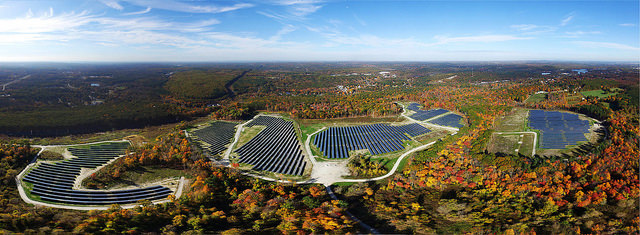It’s Time to Get SMART: Unpacking the Massachusetts Solar Expansion Proposal

On September 5, the Massachusetts Department of Energy Resources (DOER) released plans to reform and expand the Solar Massachusetts Renewable Target (SMART) program. SMART incentivizes cost effective solar and promises to double the amount of solar in the commonwealth at roughly half the cost of a previous program.
Less than one year into SMART, more than 1 gigawatt worth of projects has been approved. The rapid pace of applications for SMART projects has left the solar industry increasingly asking regulators about the future. Last week, Massachusetts officials gave their first public answer.
Program Expansion: The Industry Needs More Runway
To meet increasing customer demand for solar energy, DOER proposes adding 800 megawatts to the SMART incentive program, bringing the total to 2.4 gigawatts. SEIA supports this expansion but experience shows that solar incentives are used up quickly. That’s why, in comments to regulators, SEIA is calling for even more capacity to be added to the program.
Massachusetts must increase its use of solar to achieve its bold clean energy goals and keep pace with customer demand. Now is not the time for half steps.
The Corrections: Fixes to Lingering Implementation Issues
The recent SMART review was meant to identify potential changes that could make the program work better for Massachusetts residents. On this front, DOER proposes thoughtful regulatory clarifications and fixes.
- Metering: DOER proposes clarifying SMART metering configurations when projects are paired with storage. The clarification will impact residential and larger scale projects. These issues have drawn the ire of utilities, regulators and solar firms for the past year. DOER guidance on metering is critical.
- Municipal Projects: DOER proposes an increase to the stepped-up incentive for municipal projects. A higher incentive would make it easier for cities, towns and school districts to go solar. In addition, DOER proposes more time for municipal projects to meet certain milestones for qualification, recognizing that public projects almost always have to go through a bidding process. SEIA agrees with the intent of this proposal.
- Fixing Value for On-Site Projects: Another lingering issue is fixing compensation for solar projects serving on-site energy needs. Based on the current regulatory framework, some projects without a net metering allocation get reduced values. DOER proposes expanding the use of certain credits and changing the way energy compensation is calculated.
Discouraging Community Solar: Revisit Proposals that Restrict Access for All
The most troubling aspects of DOER’s plans involve the treatment of community solar projects, including a proposed five-fold increase in penalties for larger scale solar projects on certain lands. DOER calls for the new penalties to apply to a broader swath of community solar projects and for changes to apply to projects already in development.
These proposals would have a negative impact on the community solar market. Increased penalties will halt solar development, with penalties ranging from a few hundred thousand dollars to many millions.
DOER’s proposal is accompanied by minimal data on the conservation impact of SMART projects. Based on SEIA’s internal analysis, solar development under the prior SREC 2 program had a minimal impact on Massachusetts open space. Solar development took place on industrial properties, landfills and brownfields. Fewer than one percent of all SREC 2 projects occurred on land categorized as open space. Similar statistics are not yet available for SMART.
The proposals DOER put forward to increase penalties on larger scale solar are an overreaction to undocumented concerns. Sound, data-based policies will encourage the development of clean energy and expand access to customers who otherwise cannot choose solar.
More to Come
On balance, DOER’s proposal takes up key issues that will encourage the growth of solar in Massachusetts. SEIA is committed to this growth and will recommend additional revisions to DOER’s plans in the coming months.

